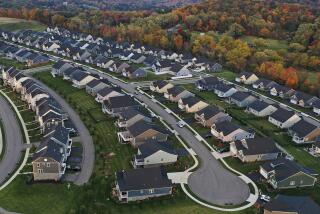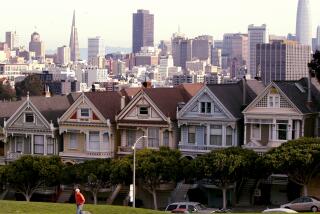Tax Cut Clouds Bush’s Urban Agenda
WASHINGTON — President Bush will arrive in Los Angeles today bearing a more ambitious urban agenda than his father offered after the city’s riots 10 years ago--but still facing charges that his tax cut has made it impossible for Washington to meaningfully confront the most pressing problems facing big cities.
Bush has spent much more time in urban settings than his father, former President Bush, whose failure to respond more aggressively to the 1992 Los Angeles riots may have been a turning point in his defeat that year by Bill Clinton.
And compared to his father, Bush has offered more comprehensive proposals to reform schools and the welfare system, to invigorate government partnerships with religious charities, and to encourage homeownership in the cities.
These initiatives generally have won Bush more praise from Democrats than almost anything else in his domestic agenda. Yet Bush continues to draw criticism from Democrats and some urban experts not so much for what he is doing in the cities as for what he isn’t.
Many critics argue that the $1.3-trillion tax cut Bush pushed through Congress last year--coupled with the unexpected costs of the war against terrorism--has denied government the funds to make significant investments in urban problems from schools to public safety. “The tax cut . . . will probably crowd out the ability to make the kind of investments that are needed,” says Bruce Katz, a former Clinton administration official who now directs the Center on Urban and Metropolitan Policy at the Brookings Institution.
White House officials reject that analysis, pointing to increased funding for federal programs aimed at high-poverty public schools and a tax credit Bush has proposed to encourage urban homeownership. “Critics of the administration are always going to talk about the tax cut,” one White House aide said, “but I don’t think it is going to affect our ability to put money into good programs.”
In some ways, these arguments echo the campaign debate over the cities between Clinton and former President Bush that flashed after the 1992 riots.
Though policy affecting the cities did not remain a central issue in that campaign, the Los Angeles riots still may have been a pivotal moment. When they erupted, Clinton was badly bruised by a Democratic primary victory that had raised questions about his honesty and integrity.
But Clinton reacted quickly to the riots. In a series of speeches and a dramatic visit to South-Central Los Angeles, he offered an extensive series of policies that blended new government spending in areas such as education, calls for personal responsibility and efforts to encourage greater private investment in the cities.
Former President Bush, meanwhile, appeared hesitant. Initially he emphasized law-and-order themes in denouncing the rioters. He didn’t tour Los Angeles until a week after the violence began--three days after Clinton. And, rather than offering new ideas, the president repeated initiatives he already had proposed.
Jack Kemp, Bush’s secretary of Housing and Urban Development, who accompanied the president on the trip, says the charge that he was not interested in the cities was unfair. But some believe Bush’s failure to respond more aggressively helped cement the image that he lacked an agenda for, or even much interest in, domestic problems.
By contrast, during his presidential campaign, the younger Bush visited urban neighborhoods more frequently than most Republican candidates to highlight his ideas for reforming schools and increasing government partnerships with faith-based charities.
Tellingly, in Los Angeles today, Bush will visit the community development arm of the First African Methodist Episcopal Church--the same church that was Clinton’s first stop when he toured Los Angeles after the riots.
“Bush is uncommonly at home,” says Kemp, who for many years has urged the GOP to court minorities. “He’s very much at ease in an urban setting.”
In substance, Bush’s approach to urban issues lands somewhere between his father’s agenda (which was heavily influenced by Kemp’s ideas) and Clinton’s. Bush’s agenda shares several common themes with Clinton’s--such as rewarding work, encouraging homeownership and spurring community action. But Bush generally supports a government role much more limited than Clinton preferred, and more expansive than his father would accept.
Education is one example. The elder Bush built his education reform agenda around vouchers that parents could use to send their children to private schools.
Though the younger Bush also supports vouchers, he constructed the education reform bill he steered through Congress last year around a federal mandate that states annually test students in reading and math--and undertake corrective actions in schools that persistently fail to improve student performance. That was a more intrusive federal role than conservatives usually prefer, but the bill passed with broad Democratic support.
Bush, though, has opposed Clinton-era ideas popular among Democrats to increase federal spending on education. Among those ideas are reducing class sizes, expanding the availability of preschool, and subsidizing new school construction. Some Democratic allies on the reform bill are now accusing him of failing to adequately fund it.
Homeownership issues show a similar pattern.
The elder Bush’s agenda was limited to a modest plan of helping tenants in public housing buy their units. Clinton emphasized a series of federal regulatory actions--including tougher enforcement of fair lending and community reinvestment laws--meant to prod banks to offer more urban mortgages. That pressure helped raise homeownership among blacks and Latinos to the highest level ever recorded.
The younger Bush hasn’t fully signaled his attitude toward those regulatory efforts. But he has proposed a tax credit for developers who build homes in low-income neighborhoods, and aides say the White House is finalizing additional proposals to encourage more private investment in urban areas.
That’s likely to draw support from at least some Democrats. Many urban Democrats, such as former HUD Secretary Henry G. Cisneros, also praise Bush for supporting high levels of immigration--which has provided a vital source of energy and population for cities that had been losing numbers.
But, echoing a common Democratic complaint, Cisneros argues that these efforts may be “overshadowed” by the disappearance of the government’s budget surplus.
“The future effects of the tax cut could undo a lot of the good of what [he’s done] . . . because there just won’t be the resources,” he says.
Counters Ronald Utt, a senior research fellow at the conservative Heritage Foundation: “The real question is whether any of these programs make any difference in the first place.”
In recent years, urban issues have attracted relatively little attention--partly because the 1990s boom improved conditions in most cities, and partly because both parties have been focused primarily on suburban swing voters.
But the Democratic criticism suggests that another big-city explosion would present this President Bush with a debate similar to the one his father faced. Though even most critics acknowledge that the younger Bush has demonstrated more concern about urban problems, they say the tax cut has enfeebled his ability to respond--leaving him, in effect, with more will than wallet, as his father once said.
More to Read
Get the L.A. Times Politics newsletter
Deeply reported insights into legislation, politics and policy from Sacramento, Washington and beyond. In your inbox three times per week.
You may occasionally receive promotional content from the Los Angeles Times.










